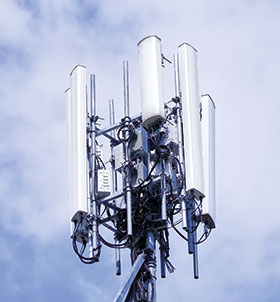

Three South African mobile service providers – MTN, Vodacom and Rain – recently announced the beginning of the 5G roll-out on their networks. The transformative impact of the technology will immediately begin to be felt across sectors, but as the roll-out expands, it will begin to fundamentally influence the way we live, work and interact.
A key advantage of 5G technology is that it is a more cost-effective way to serve more subscribers. The 5G roll-out will enable networks to serve more South Africans in rural areas at lower cost and begin to empower more people through access to connectivity.
“When building a base station, the biggest cost is the construction,” said Huawei Carrier chief technical officer Paul Scanlan in a recent interview. “Because 5G components are more compact, the base stations are less expensive to build, which means coverage can be broader and more affordable. Customers then get a better service, at less cost. In this way, we continue to narrow the digital divide that deprives poor people of opportunities.
“Where 5G has been rolled out, we are seeing a significant growth in data services and the explosion of connected devices.”
Another significant advantage of 5G over 4G is its lower latency – the time it takes to send information from one point to another. 5G provides quicker responses and more precise communication without lags. The change is significant enough to revolutionise communications that rely on fast linkages, such as gaming, and the Internet of Things (IoT).
“5G is really a platform for transformation,” said Scanlan. “It gives consumers a whole new range of opportunities.
“For businesses, augmented and virtual reality offer huge opportunities for training, not just in terms of effectiveness, but the speed with which knowledge can be transferred. When a trainee can experience situations in virtual reality, as they would look in practice, their knowledge is immediately more relevant and applicable. This will have enormous productivity benefits.”

The IoT will revolutionise the maintenance of plant, machinery and equipment, when thanks to low-latency communications, every piece of equipment will be constantly reporting its status and whether it requires maintenance. Termed ‘predictive maintenance’, this will bring massive savings for companies, but also for entire countries, when utilities such as energy, transport and water can be more effective and less costly to run.
Because of the vast benefits, it is also in the interests of countries to facilitate the licensing and approval of 5G, and the allocation of spectrum to 5G providers as soon as possible.
“Since 5G is such an incredible platform for transformation, once it is fully enabled, the benefits will increase by several orders of magnitude – for government, the economy and for industrial development,” said Scanlan.
The productivity benefits would boost the economy, creating new jobs in the information economy.
“We’re going to need new skills. We’ll be upskilling people far more quickly, using 3D modelling and VR training. Where previously, a tradesperson might have to go through four years of classroom training, now, he or she can receive training practically, via remote learning, from industry experts anywhere in the world and become qualified in a fraction of that time.”
Resource benefits
Remote monitoring, enabled by the greater speeds of 5G, can also support more precise management of agriculture. An example in the fish farming space would be monitoring and measuring fish to ensure the optimum feeding schedules.
For crop farming – under pressure from booming populations and climate change – 5G connectivity now allows constant measurement of soil nutrients and even satellite monitoring of fields to indicate when and how to apply fertiliser, adjuvants and pesticides for the best possible crop yields.
In mining, the faster connectivity of 5G means mines can now be run using automated vehicles and machinery, and managed remotely. This makes for greater mechanisation, fewer accidents between humans and machines, and greater efficiency.
Economic enablement
Another component of the Fourth Industrial Revolution (4IR) likely to come into its own with the expansion of 5G connectivity is 3D printing, which will allow people to ‘print out’ and create any specialised tool they might require in their choice of materials, on site, at short notice.
Because of 5G’s greater speed and efficiency, it also carries sustainability benefits for the planet and for society, as it enhances efficiencies in the use of scarce resources.
“The true benefits for countries lie not in the selling of network licences, but in the economic enabling factor that 5G represents,” said Scanlan. He also sees 5G having the greatest impact through greater connectivity in the health, education and agriculture spheres.

© Technews Publishing (Pty) Ltd. | All Rights Reserved.